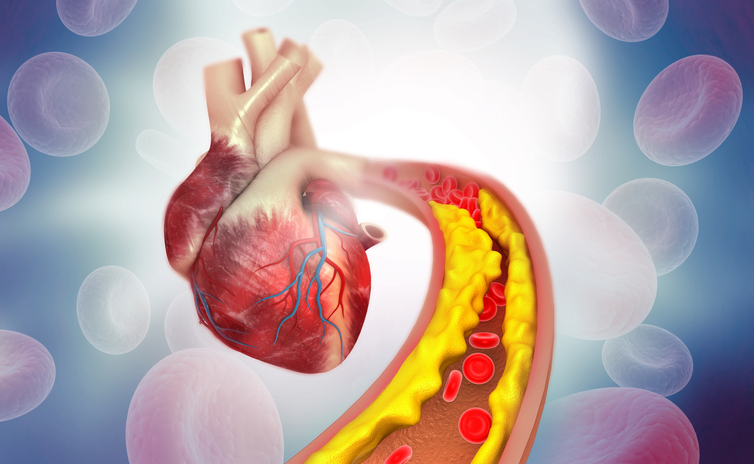Science
New Resource Links LDLR Gene Variants to Heart Disease Risk

An international research team led by scientists from the University of Toronto and the University of Pittsburgh School of Medicine has developed a groundbreaking resource aimed at identifying individuals at genetic risk for elevated levels of low-density lipoprotein (LDL) cholesterol, often referred to as “bad” cholesterol. This cholesterol type is a significant contributor to heart disease, with the team classifying nearly 17,000 missense coding variants of the LDL receptor (LDLR) gene.
The researchers created detailed maps that correlate specific genetic sequences with their functional consequences, offering insights into LDL receptor protein structure and its uptake. This resource is expected to assist clinicians in predicting a patient’s risk for heart attacks and strokes, potentially allowing for timely preventive measures and treatments.
Frederick Roth, PhD, professor and chair of computational and systems biology at the University of Pittsburgh, emphasized the importance of this research. He noted that individuals with normal LDL levels could still face an increased risk of heart attacks due to damaging variants in the LDL receptor. “By identifying damaging LDL receptor variants, clinicians can initiate preventive treatment early on and mitigate risks,” Roth stated.
The findings were published in the journal Science in March 2024, in a paper titled “The functional landscape of coding variation in the familial hypercholesterolemia gene LDLR.” The study outlines how the team assessed the impact of about 17,000 LDLR missense coding variants on both LDL receptor cell-surface abundance and LDL uptake. This resulted in sequence-function maps that reflect established biochemistry and provide valuable insights into clinical variant interpretation.
Heart disease continues to be the leading cause of death in the United States, claiming nearly 700,000 lives annually. While lifestyle factors such as diet and exercise contribute to heart health, genetic predispositions play a crucial role in the development of conditions like atherosclerosis. The research highlights how minor variations in the LDLR gene can significantly increase the risk of heart disease.
The authors of the study explained that variants in the LDLR gene, which is a critical genetic driver of cardiovascular disease, can elevate LDL cholesterol levels and lead to premature atherosclerosis. They pointed out that heterozygous familial hypercholesterolemia (HeFH), characterized by increased LDL cholesterol, is one of the most common genetic causes of cardiovascular disease. The study also noted that genetic variants in LDLR account for approximately 80% of molecularly diagnosed HeFH cases.
In healthy blood vessels, LDL acts as a carrier for “good” cholesterol, essential for cell membranes and the production of hormones and vitamins. Conversely, genetic mutations that impair LDL receptor function can result in dangerously high LDL levels. The identification of pathogenic LDLR variants is crucial for accurate diagnosis and management of heart disease, surpassing traditional lipid profiling methods.
Despite advancements in gene sequencing technologies that can decode a person’s genetic makeup from small tissue samples in a matter of hours, interpreting this data remains a challenge. Most LDLR coding variants currently lack definitive clinical classification, limiting opportunities for early diagnosis and patient risk stratification for HeFH.
The research team classified nearly 17,000 modifications of the LDL receptor gene and their effects on LDL receptor functionality. Their approach measured each protein variant according to its mechanism of action and its impact on LDL clearance efficiency. The resulting sequence-function maps not only reflect the current understanding of LDLR function but also reveal unexpected biochemical insights.
Dan Roden, MD, a clinician-scientist at Vanderbilt University Medical Center and co-author of the study, remarked on the potential impact of these findings. “New unclassified variants are seen all the time in the clinic, and we often don’t have the evidence we need to inform patient care. These variant impact scores have the potential to increase the number of diagnoses of familial high cholesterol for those with unclassified variants by a factor of ten.”
The study also uncovered a subset of LDL receptor variants whose uptake of LDL was inhibited by high levels of very low-density lipoprotein (VLDL), a precursor to LDL. This unexpected finding opens new avenues for research into the implications for human health, as noted by first author Daniel Tabet, PhD, at the University of Toronto.
This cholesterol-focused research forms part of a larger initiative, the Atlas of Variant Effects Alliance, co-founded by Roth, which aims to map the functional impacts of genetic variants across various inherited disorders. This collaboration now includes over 500 scientists from 50 countries, all working to create comprehensive maps that evaluate gene variants affecting numerous diseases on a global scale.
-

 Science2 weeks ago
Science2 weeks agoResearchers Challenge 200-Year-Old Physics Principle with Atomic Engines
-

 Politics2 weeks ago
Politics2 weeks agoNHP Foundation Secures Land for 158 Affordable Apartments in Denver
-

 World6 days ago
World6 days agoBoeing’s Aircraft Production: Assessing Numbers and Challenges
-

 Lifestyle5 days ago
Lifestyle5 days agoTrump’s Push to Censor National Parks Faces Growing Backlash
-

 Entertainment5 days ago
Entertainment5 days agoSyracuse Stage Delivers Lively Adaptation of ‘The 39 Steps’
-

 Health2 weeks ago
Health2 weeks agoNeuroscientist Advocates for Flag Football Until Age 14
-

 Lifestyle2 weeks ago
Lifestyle2 weeks agoLongtime Friends Face Heartbreak After Loss and Isolation
-

 Science6 days ago
Science6 days agoAI Misidentifies Doritos Bag as Gun, Triggers Police Response
-

 Lifestyle6 days ago
Lifestyle6 days agoRed Bluff High School’s Elli Nolan Named Rotary Student of the Month
-

 Health2 weeks ago
Health2 weeks agoFDA Launches Fast-Track Review for Nine Innovative Therapies
-

 Politics4 days ago
Politics4 days agoNFL Confirms Star-Studded Halftime Show for Super Bowl LVIII
-

 World2 weeks ago
World2 weeks agoGlobal Military Spending: Air Forces Ranked by Budget and Capability









